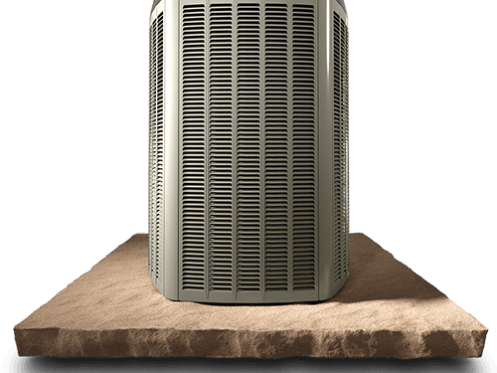Are you planning to buy an HVAC system for your home? A common mistake that most people make is buying the wrong-sized HVAC system. For instance, if you buy an HVAC unit that is too small for the size of your house, the HVAC system will be forced to work twice or thrice as hard to regulate your home’s temperature.
Additionally, you will spend more money on repair costs and energy bills. So, how do you determine the best HVAC unit capacity for your home? Below are some of the key factors to consider when choosing the best-size HVAC system for your space.
Your Home’s Square Footage
The most important factor you need to take into consideration when buying an HVAC system is the size of your home. Finding your home’s square footage is quite easy, depending on the shape of your home. If your house has rooms that are square or rectangular in shape, you can determine the square footage by multiplying the length and width of each room.
In case your house is multidimensional, we recommend dividing it into several sections, calculating the square footage of each section, and adding up the results. If your home has circular rooms, simply measure the length on one end of the room to another then divide it by two to find the radius. Once you have the radius, calculate the area of the room to find the square footage. Do this for all the circular rooms in your house and add the results.
Tip: When calculating your home’s square footage, ensure that you leave out the spaces that you do not plan to heat or cool. Such spaces may include corridors, balconies, and sunrooms, among others.
Once you have your home’s square footage, you can find the best HVAC system capacity for your home based on its BTU (British Thermal Units).
British Thermal Units
BTU is a universal unit of measurement used to indicate the cooling capacity of an AC unit. To calculate the amount of BTU required to heat or cool your home effectively, simply multiply your home’s square footage by 20. This is because the general rule of thumb indicates that you need 20 BTUs to cool one square foot.
For example, if a rectangular room in your house is 50 feet wide and 29 feet long, multiply the length and width to find the square footage. Since 50 X 29 = 1450, 1450 is the square footage of the room. To calculate the BTU, multiply 1450 by 20 to get 29,000 BTUs.
Here is a square footage and BTUs guide that will help you find the right-size HVAC system for your home.
- 100-150 sq. ft., 5000 BTUs
- 150-250 sq. ft., 6000 BTUs
- 250-300 sq. ft., 7000 BTUs
- 300-350 sq. ft., 8000 BTUs
- 350-400 sq. ft., 9000 BTUs
- 400-450 sq. ft., 10000 BTUs
- 450-500 sq. ft., 11,000 BTUs
- 500-550 sq. ft., 12000 BTUs
You can also find online calculators that can help you determine the best HVAC capacity for your home based on the figures you add to them.
The Size and Quality of Ductwork
Did you know that damaged, leaky, or loosely installed ductwork may cause air to escape from your house? This will, in turn, cause your HVAC system to work twice as hard to maintain the desired indoor temperature. Therefore, before you purchase an HVAC system, consult with an HVAC professional who will check the status of the ductwork in your home. Additionally, the HVAC expert may help you match the quality and size of your home’s ductwork with the right-size HVAC system.
Also, depending on the size of the air ducts, our HVAC experts can seal any leaks. They may also recommend that you install new ductwork to improve the quality of air in your home.
The Insulation Level of Your Home
Your home’s insulation level plays a significant role in determining the best HVAC capacity for your home. For instance, if your home is well insulated, warm or cool air will be easily retained within the building instead of escaping outside. This means that your home will require a less powerful HVAC system because the house is properly insulated.
On the other hand, if your home has openings or gaps in the windows, doors, ceilings, or attic, the house is poorly insulated and will require a powerful HVAC system with a bigger capacity. This will ensure that your home remains cool during summer and warm during winter.
Therefore, before you purchase and install an HVAC system in your home, find out whether the house has air leaks.
Tip: Consider weather stripping the windows and doors to prevent cool or warm air from escaping your home, thereby allowing the HVAC system to operate efficiently.
The Number of People in Your Home
The human body releases a considerable amount of heat that affects the temperature of a home. The BTU system works on the assumption that every room in your home contains approximately two people. Therefore, if there are more than two people in your household, you will need an additional 600 BTUs for each person per hour.
Additionally, if your home has a gym, add about 380 BTUs for every person that uses the gym at a specific time. This is because the workout activities in the gym will increase the amount of heat released into the room.
The Type of Windows
What type of windows does your home have? Do you have big windows in your home? Although large windows are appealing and they add a modern edge to your space, the windows may affect your home’s temperatures negatively. Large windows allow more heat into your home. This raises the total volume of air in your home, thereby increasing the amount of air that the HVAC system needs to cool. The opposite effect is true in the winter.
Therefore, if the rooms in your home have more than one large window, ensure that you add a 10% BTU for every additional window to the total BTU amount. This will allow you to find the HVAC system with the right capacity for your home.
Alternatively, if your home has large windows that are properly insulated and you can manage to keep the blinds, curtains, and shutters closed the majority of the time, you will be able to keep out the excessive summer heat; and your HVAC system will work just fine.
The Climatic Region of Your Area
If you live in a mildly hot area, your home has cooling needs that is different from a house in a humid hot area. Therefore, if you live in a hotter region, keep in mind that your HVAC unit will work harder to maintain the required indoor temperatures.
We recommend adding about 10% or 20% BTUs for every room in your home to keep your space comfortable.
Get Started With Meade’s Heating and Air Today
Are you looking for a trustworthy HVAC company in Sterling, VA, or within Northern Virginia? Meade’s Heating and Air is the team to work with. Feel free to reach out to us about how to select the right-size HVAC system for your home. We offer Heating and cooling services. Call Meade’s Heating and Air today to speak to an HVAC expert.




